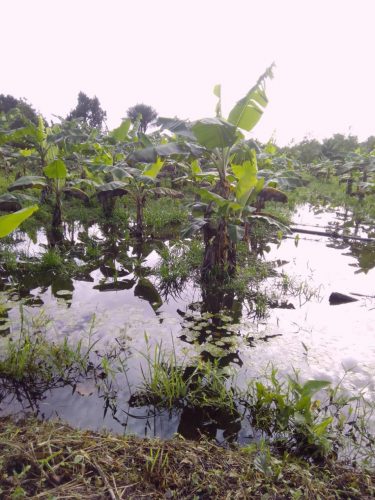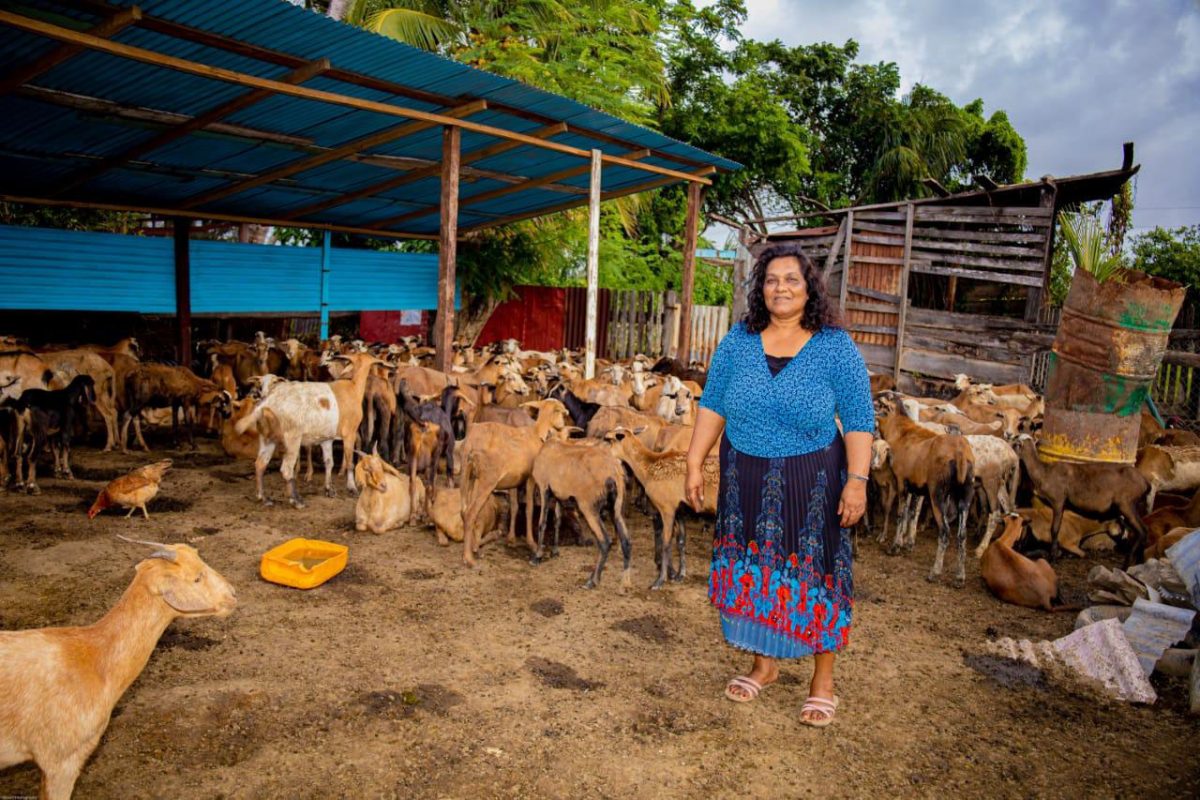The current May/June rains and what is being reported as their consequential widespread flooding, damage to homes, displacement of families and loss of income due mainly to flooding of lands under cultivation and inundation of pasture lands has been the subject of investigation by the Stabroek Business for the past two weeks.
Up to last Wednesday the newspaper had been in touch with farmers at some of the coastal extremes of the country. The rains and the attendant flooding continues and evidence of an official response notwithstanding, several pockets of emergency have emerged from what, reportedly, are some of the worst floods in the country’s recent history. The flooding appears to have affected, to varying degrees, all of the country’s ten administrative regions, reportedly rising by as much as eight to nine feet in some communities. The likelihood of long-term loss of earnings, particularly in the instances of farming communities, is high.

Kamaldai Williams and her two sons Elvis and Moses and their wives represent a microcosm of what for many in the agricultural sector, is nothing short of an unmitigated disaster. The Stabroek Business had met this mostly cattle-farming family back in 2015. At the time they had owned about 600 head of cattle. They were also rearing goats, sheep and ducks. Long before the current floods had wreaked their present havoc, cattle rustlers had preceded them, significantly reducing the herd. When the floods came there were 300 head of cattle remaining. There were also around 400 sheep, 200 goats and six horses. All of the horses have now died.
When we spoke with Kamaldai, the cattle that have not been claimed by the floodwaters now dwell in the swamp of the Whim/Letter Kenny area. She is unprepared to speculate as to how many will eventually survive. What is left of her flocks of sheep and goats

moved to the Williams’ Alness home must compete for space on the small area of reasonably dry land close to the house. Kamaldai anticipates many more casualties amongst what is left of her stock. No less depressing, she says, is the fact that her sons appear inclined to throw in the towel. The mental health of the entire family has been affected by the floods and their consequences, the beleaguered widow says. The floods have come just two years after the family had spent upwards of $500,000 effecting renovations to the spread.
At the opposite end of coastal Guyana, Sam Barakat, 67, is a farmer at Nashville, in the Pomeroon River. He cultivates citrus, avocados, plantains, bananas and cassava on his thirty-acre farm. His entire farm is under water and he is concerned over the likely eventual extent of the loss of crops. Even now, with the rains far from over, he anticipates that it will take him “years” to recover. The Pomeroon area is no stranger to flooding even though, this time around, he says, has been the worst for several years.
The President of the Gibraltar- Fryish Farmers’ Association Andora Forde is brooding over the fact that the Association’s 200-acre spread is under water. The livelihoods of about thirty farmers are ‘up in the air’ with losses likely to run into millions of dollars. The Association’s farmers cultivate cash crops, cauliflower, grapes, broccoli, plantains, bananas, ginger and turmeric among others. These farmers are seasonal workers who have invested in agriculture to supplement their earnings as sugar workers. The crops, Andora says, will have to be replanted and as is the case with Mr. Barakat, it will take them several years to fully recover.
The Association has been visited by a NAREI Extension officer and the Regional Chairman for East Berbice-Corentyne, David Armogan met with some of the farmers. President Irfaan Ali was due to visit the community on Wednesday.
Oscar and Michellina Richmond are farmers. They, too, live and work at Pomeroon, Jacklow, to be precise, on the Pomeroon River. When we engaged them their farm had been under water for two weeks. They cultivate cassava, plantain, banana and avocados among other fruit, trading under the name Green Diamond. Over the years the Richmonds have built up an impressive range of agro-processing products. The Covid-19 pandemic has slowed their sales and now, to them, the rains have added insult to injury. All of this, Michelina says, on top of the recent loss of her mother. Perhaps the one saving grace in all this, she says, is that IPED has afforded her a stay on the repayment of an outstanding loan.
Here in Georgetown the Stabroek Business met Sherman Austin, who along with his sister trade on Merriman Mall. Sherman is a farmer. He sells his produce, mostly fruit, to vendors at Bourda Market. Sherman and his sister travel from Charity, Essequibo Coast to Merriman Mall once weekly to ply their trade. Apart from the produce from his own farm he purchases produce from other farmers, mostly in the Pomeroon River. Last Monday, he made what he said would be his last trip to the city “for the time being.” His farm, along with others in the Pomeroon area are under water and for him, trading has come to a shuddering halt.
Andrea Seechun is a standout female farmer from Adventure whom the Stabroek Business had previously met. The floods have robbed her of large quantities of food seasonings. She has, she says, “called it a day” until the flooding subsides. Her husband, Jagmohan, a rice farmer is hedging his bets. Only sixty acres of the family’s eighty-acre rice plot have been planted.
Winston Munroe too, a rice farmer from Liverpool, Corentyne is under pressure. Munroe has eighty acres of rice land. He began planting on May 2. By mid-May, the rains had come and flooded the rice lands. The big question, he says, has to do with what his eventual yield will be. At the very least he is hoping to recoup the $2 million invested in the current crop which includes spending on fuel, paddy, labour and fertilizer.
The fate of the current rice crop is, understandably, a matter of particular concern to Nand Persaud and Company, the rice giant of the region. The company’s General Manager, Mohindra Persaud, told the Stabroek News earlier this week that the company is likely to secure no more than 70% of what they normally purchase from the crop due for harvesting in August. He makes no secret of the fact that the shortfall is likely to affect the company’s ability to fulfill its customary exports market commitments.
Persaud told the Stabroek Business that in the light of the current flooding many farmers are likely to reduce acreages under cultivation. Some, he says, may simply plant no rice at all. He mentioned, however, that most of the rice-growing areas in the region including Black Bush, Crabwood Creek, and the Corentyne Coast, among others, have commenced planting. Some pumps are available that can work twenty-four hours along the kokers to assist in moving the water off the land, Persaud says.








